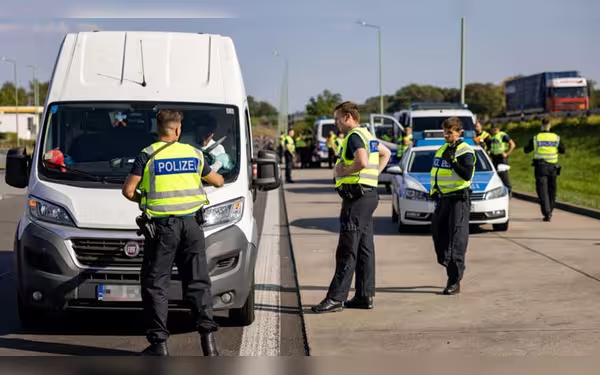Saturday, November 16, 2024 03:16 PM
Germany Implements Stricter Border Controls to Address Migration Issues
- Germany expands border controls with all nine neighboring countries.
- Interior Minister emphasizes measures to combat criminal activities.
- Chancellor faces pressure for tougher migration and asylum policies.
 Image Credits: dailytimes_pk
Image Credits: dailytimes_pkGermany expands border controls to curb irregular migration amid rising public safety concerns.
Germany has recently announced a significant expansion of its border controls with all nine of its neighboring countries. This decision comes as a response to increasing concerns over irregular migration and rising support for the far-right political party, Alternative for Germany (AfD). The move follows a series of tragic extremist attacks that have heightened public fears and intensified political pressure on the government.
Starting Monday, Germany will implement these border controls for an initial period of six months. The aim is to prevent irregular migrants from entering the country. Interior Minister Nancy Faeser emphasized that the measures are designed to combat criminal activities and to identify potential threats early on. The new controls will include temporary structures at land crossings and random checks by federal police.
Germany shares borders with nine countries, many of which are part of the Schengen zone, which typically allows for the free movement of people. However, the recent rise in extremist violence has prompted a reevaluation of these policies. The border controls will now extend to Germany's frontiers with France, Luxembourg, the Netherlands, Belgium, and Denmark, in addition to existing measures with Poland, the Czech Republic, Austria, and Switzerland.
While the German government aims to minimize disruptions for residents in border areas, it has advised travelers to carry identification when crossing borders. This precaution is essential as the country grapples with the aftermath of recent attacks, including a knife attack in Solingen that resulted in multiple casualties. The suspect in that incident had previously been flagged for deportation but managed to evade authorities, raising questions about enforcement and security.
As national elections approach, Chancellor Olaf Scholz's government faces mounting pressure to adopt a tougher stance on migration and asylum policies. During a recent visit to Uzbekistan, Scholz signed a migration deal aimed at facilitating the entry of workers into Germany while also streamlining deportation processes for those who do not qualify for asylum. This dual approach reflects the government's attempt to balance economic needs with public safety concerns.
However, the tightening of Germany's borders has raised alarms among other European nations. Leaders from countries on the outer edges of Europe, such as Greece, have expressed concerns that Germany's actions may shift the burden of managing migration onto them. As the European Union grapples with the complexities of migration, the need for a coordinated response becomes increasingly clear.
Germany's decision to expand border controls is a reflection of the growing challenges posed by irregular migration and public safety concerns. As the situation evolves, it is crucial for European nations to work together to find effective solutions that address both security and humanitarian needs. The balance between protecting borders and upholding the values of openness and cooperation will be a defining issue for Europe in the coming years.













